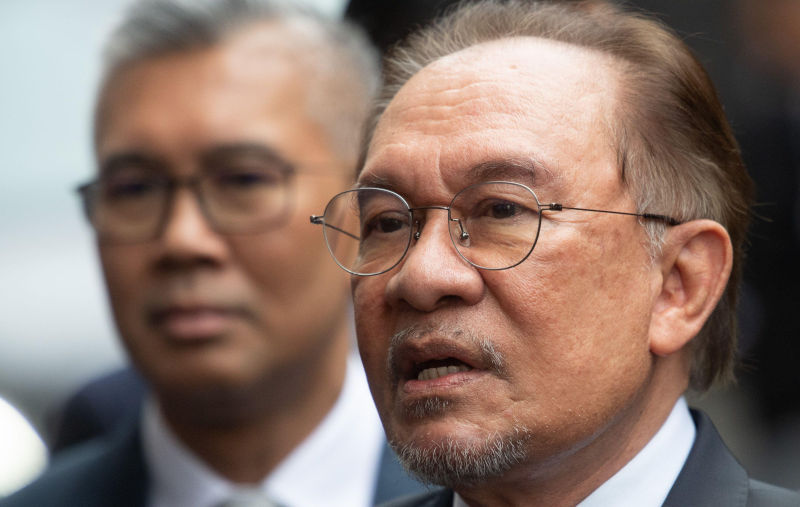Asian vision of peace a bulwark against “America First”
January 30, 2025
At the 2025 World Economic Forum in Davos, Malaysian Prime Minister Anwar Ibrahim stood out as a voice of reason and diplomacy, presenting the Asian vision of peace, development, and regional cooperation.
Representing a nation with one of Southeast Asia’s fastest-growing economies, Anwar showcased a pragmatic and authoritative approach to resolving disputes, emphasising dialogue and economic cooperation over confrontation. He spoke with conviction about safeguarding Malaysia’s autonomy while fostering productive relations with neighbours and major powers alike.
In response to questions about China, Anwar rejected the notion of singling out its big neighbour over South China Sea tensions. He urged for constructive engagement, underscoring the importance of Southeast Asian collective framework – through ASEAN – in fostering stability and growth across the region.
In stark contrast, US President Donald Trump represented a radically different style of leadership. As the leader of a superpower that has long dominated global affairs, Trump projects power through his America First lens.
Trump’s transactional and bombastic style, marked by an unapologetic tendency that alienates allies and antagonises adversaries alike. His approach to neighbours Canada and Mexico underscores this. His administration’s threat to impose 25% tariffs on Canadian and Mexican goods, coupled with derogatory remarks suggesting Canada could become America’s “51st state” or that the Gulf of Mexico should be renamed the “Gulf of America,” epitomises an outlandish attitude that many view as bullying. This is a far cry from the good-neighbour policies advocated by Anwar.
Trump’s character and leadership style stand as an extraordinary departure from the traditional frameworks of western political thinking. When judged against the ideals of western political philosophers – Aristotle, Machiavelli, and Max Weber – Trump defies categorisation.
Aristotle’s concept of virtuous leadership, centred on moral responsibility and the pursuit of the collective good, seems almost antithetical to Trump’s approach, which prioritises personal gain, spectacle, and division over unity. Machiavelli’s pragmatism and emphasis on power maintenance align superficially with Trump’s transactional methods, yet even the Florentine would likely balk at Trump’s unpredictable impulsiveness and disregard for calculated strategy. Weber’s notion of charismatic authority fits more closely, as Trump’s populist appeal and ability to galvanise unwavering support reflect the power of charisma over traditional rational or institutional authority.
Yet Trump’s charisma is often accompanied by a destabilising force, reshaping the boundaries of what is considered acceptable in political life. In breaking every mode of leadership espoused by Western political philosophy, Trump embodies a paradox: a leader whose influence stems not from adherence to established norms but from his ability to dismantle them with uncaring audacity and appeal to his large base of supporters.
The difference in leadership styles becomes even more striking when considering Trump’s and his wife’s launch of meme cryptocurrency just ahead of his second inauguration. This move raises questions about the priorities of national leadership. Trump’s actions seem detached, trivialising the role of a leader. His focus on self-promotion and profit exemplifies a shift in political norms, where responsibility takes a back seat to spectacle and personal gain.
Trump’s behaviour has broader implications for the global perception of American zeitgeist and the integrity of the so-called “western liberal order,” a much-used term by his immediate predecessor Joe Biden and his administration. This term will likely drop out of usage during Trump’s era, as the current president focusses on America First.
In contrast, Asian leaders like Anwar and Chinese President Xi Jinping offer models rooted in long-term planning and collective well-being. Xi continuously emphasises development, multilateral cooperation, and pragmatic governance, which stand in stark opposition to the bluster and imperial rhetoric associated with Western leaders like Trump, Biden and former British prime ministers Boris Johnson and Liz Truss.
Asia’s political ethos is inspired by very different cultural roots. A good example is the Confucian ideals of harmony and moral responsibility, and ways for resolving disputes through dialogue and mutual respect, fostering an environment of peace and cooperation.
To western media sensibilities, projected to global audiences, Asian leaders may appear dull and stilted when compared to the Hollywood-esque theatrics of American politics. However, many of these leaders are serious-minded individuals with substantial contributions to their nations.
Consider Xi Jinping and the senior Chinese leaders often labeled as “colourless” by Western commentators. Despite their understated demeanour and measured language, they have delivered significant progress for the Chinese people. This prompts an important question: how can these seemingly unremarkable figures be so effective for their citizens? Could it be that biases obscure a clearer understanding of their capabilities in the west?
As the unipolar era of US dominance fades, the world faces a pivotal moment. Will nations align with traditional metrics of imperial power, or will they gravitate toward models of leadership that prioritise cooperation, inclusivity, and the common good? The answer lies in the ability of leaders to rise above narrow self-interest, balancing power with purpose and pragmatism with moral responsibility.
Ultimately, the quality of leadership will define the trajectory of this new geopolitical reality. Leaders like Xi Jinping and Anwar Ibrahim show that it is possible to navigate complex challenges without sacrificing integrity or dignity.
In this critical moment, leaders must choose – perpetuate a system that prioritises hard power and profit, or rise to the occasion with vision and integrity? The high stakes – war and conflict, geopolitical instability, poverty, climate change – demand nothing less than transformative leadership that addresses the real needs of the people.

